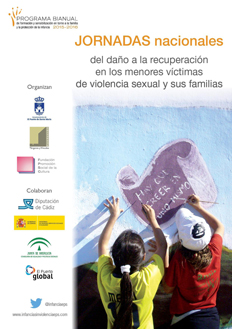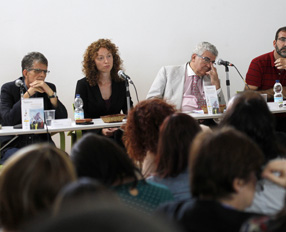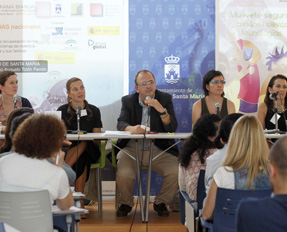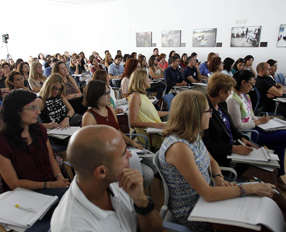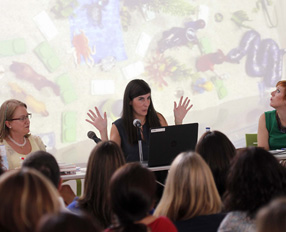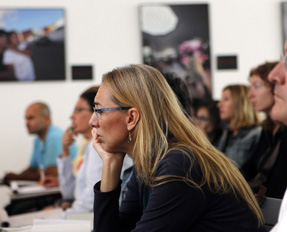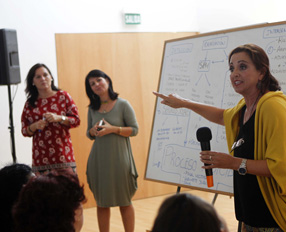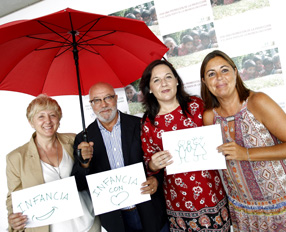The come into effect of the Organic law amending the system of protection of children and adolescents, establishes a new framework of minors rights in Spain.
The law contains advances for the protection of minors in the phase of investigation of cases of sexual violence, preliminary investigation and the trial phase.
It incorporates many new features, including the prevention of violence through Internet and new technologies, where the crime of sexual abuse is contemplated without contact when the minor is proposed a meeting or participating in a sexual act through the media, and access by educational institutions and entertainment to track paedophiles to prevent their recruitment, and the prevention of violence among equals.
These were some of the ideas set out in the framework of the National Conference “Damage to the recovery of children victims of sexual violence and their families”, in the town of El Puerto de Santa María, Cádiz, in the “Civic Centre Augusto Toulon” on 1 and 2 October. These sessions were organized by the city of El Puerto de Santa María, the Margins and Links Foundation, the Foundation Social Promotion of Culture, the Provincial Council of Cadiz and with the active collaboration of the Ministry of Health, Social Services and Equality, the Andalusian Regional Government and the Municipal Company “El Puerto Global”.

On the first day the opening session of the conference took place by the Mayor of El Puerto de Santa María, David de la Encina Ortega, the Office for Equality and Social Welfare of the Provincial Council of Cadiz, Isabel Armario Correa, Councillor for Citizen Participation, Equality and transversal policies of the City of El Puerto de Santa María, Matilde Roselló del Castillo, President of the Margins and Links Foundation, Francisco Mena Mira and the General Director of the Foundation Social Promotion of Culture, María Beamonte Sáez.
Then the question of “What we mean by sexual violence against children and how to detect it” was addressed through the presentation of Eva Gonzalez Ortega, Dr. in Psychology and expert in sexuality, childhood and adolescence at the University of Salamanca, who, among other aspects, stressed that there are two essential components for there to be sexual abuse of a minor: the asymmetry in age between the victim and abuser, and coercion. She also noted that in one third of detected cases the perpetrator is a minor.
After this session, the conference “Intervention from the standpoint of health to sexual violence to minors” by Jesús García Pérez, President of the Spanish Society of Social Paediatrics, took place, he told us that for the health team in charge to explore the minor to obtain medical evidence of abuse, the only concern should be the welfare of the child, this intervention should never be held in police premises, and whenever possible the paediatrician or gynaecologist should be a woman.
He said that besides the importance of giving the child positive reinforcement during the process to help clarify what happened, you have to remove the guilt and reduce their fear of the aggressor and observe non-formal language, sometimes silence is more eloquent than the verbal language.
Next Víctor Sancha Mata, from the Ministry of Health, Social Services and Equality addressed the issue of “National policies on protection of children from sexual violence”. He explained that a total of 3,364 minors were victims of crimes against sexual freedom in Spain between 2013 and 2015, twelve children were killed and 38,495 were victims of a crime or penalty foul and noted the reform of the Penal Code to include European directives requiring member states to toughen criminal penalties in the fight against sexual abuse, children sexual exploitation and child pornography.
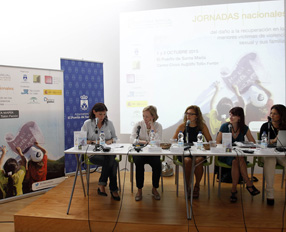
In this round table, open to the participation of professionals attending, the Malaga Juvenile fiscal said she understood how difficult it is for the assessment, diagnosis and treatment teams when working with a child who has been abused by a father or uncle and the mother does not want to report the case.
Experience shows, she noted, that most of the acts of sexual violence against minors take place in the closest family, and urged to record all tests with children to prevent secondary victimization, that is, psychological damage derivatives from the need to repeat their testimony to the police, social services, prosecutor or judge.
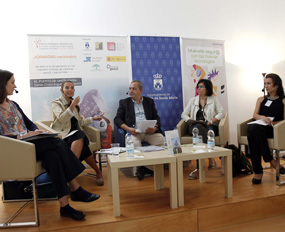
During the session there were addressed phenomena like: The “cyber-bullying” or school cyber-bullying, “grooming” or sexual abuse by an adult to a child, “sexting” when minors publish images or explicit sexual contents. Sites and forums such as: pro-ANA (anorexia), pro-MIA (Bulimia) and Self-HARM. There were analyzed the risks, the effects on victims, the motivations of young people committing unsafe practices and how to prevent them. It was highlighted the different response of schools to situations of school harassment and cyber-bullying and the need for mediation.
Ana Luiza Rotta stressed that it is not a question of children pornography but images of sexually abused children and it must be raise awareness of the fact that while the abusers are not stopped, the child is still embarrassed. For police operations to end up with success, it is very important the reports of citizens to the police and international collaboration through anonymous hotlines against child pornography.
Agnieszka Wrzesien explained the importance of awareness campaigns as a way to prevent abuse through the network or harmful behaviour by minors. She offered several examples in Poland and highlighted the fact that in her country the subjects of empowerment of children in the use of ICT have been included in the education system curriculum.
Maria Salmeron provided information about diseases and problems resulting from misuse of new technologies that she observes in patients in the exercise of her profession as a paediatrician in prevention, diagnosis and treatment of cyber bullying, which in most cases are related to problems in the family and school.
She stated that the family is no longer the first reference group for a teenager, now the group to which he belongs is the network. She added that they are unable to understand that what they do online can have detrimental consequences later. She explained that the front of the brain, which exercises control over impulses and emotions, has not finished forming in an adolescent and hormones boiling are added, so they are always willing to take risks of which they are unaware. “I always tell parents that it is not a question of prohibit but to learn new technologies, lose their fear and interact with their children through them in order to have better control,” stated the paediatrician.
Celia Nevado, who that afternoon also gave a lecture on “Sex offenders: why they attack and how to intervene early,” explained that it is normal in the character of teenagers to look for new sensations and approach to risk, but added that the Internet and new technologies are a tool misused that can turn them into victims or aggressors. She added that the constant creation and dissemination of new applications make for the adults hard to follow the use the minors’ do of them, who have more ability to adapt and use them.
This was followed by the round table entitled “Walking to recovery: The process of psychosocial intervention in victims of sexual violence.” It was moderated by Rosalia Serrano Risueño, Psychologist and Coordinator of the evaluation and treatment of child victims of sexual violence team (Jaen), and was attended by Carmen Manuel Vicente, Clinical Psychologist Unit of Child and Adolescent Mental Health (Cádiz) and Maria Angeles de la Cruz Fortún, Dr. and psychologist of the Center for Assistance to Victims of Sexual Assault (CAVAS) of Madrid.
Carmen Manuel Vicente stated that mothers of abused children are secondary victims of the violence suffered by their sons or daughters. And she wanted to break the myth that tends to blame the mother when a father exerts sexual violence against his daughter and people make co-responsible the mother, accusing her of not realizing or not doing anything about it.
“We will not deny that there are some accomplices or negligent mothers, but there are many more who want to help their children,” it is necessary to re-conceptualize the role of the mother as a secondary victim of sexual violence against her son and that it is also necessary to recover her because her support in the recovery process of the child is paramount. She added that maternal support is the most significant factor and it is necessary to have a specific space for therapy with mothers, offering them support, strengthening their protective capacity and creating favourable conditions for their recovery and that of their son.
Maria Angeles de la Cruz explained how important in therapy with children victims of sexual violence, is to restore the attachment they had with their reference figures, with their loved ones. A child abused by his father suffers a total breakdown of his world, and we must give it back, restore the lost world creating new links, new attachment with the people around them. De la Cruz also wanted to destroy the false myth of guilt or guilt-ridden mother and stated: “The only culprit is the abuser.”
The sessions ended with a workshop on “Good practices in coordinated assistance in sexual violence against minors” They were attended by Maria Jesus Orihuela, Psychologist and Coordinator of the evaluation and treatment of child victims of sexual violence team (Cadiz), Pilar Rivas Lobo, Psychologist of the Family Treatment of Social Services in the City of El Puerto de Santa María and Ana Domínguez Varela, Psychologist of the Regional Government of Andalusia in Cádiz.
All presentations and panel sessions were followed by a space for debate and dialogue with active participation by the public. To cover the debates, we had the excellent help of young people with intellectual disabilities from FEPROAMI.
During the session on Oct. 2 everyone present joined the manifesto submitted on that date, for a promotion of the protection and good treatment of children in Spain, promoted by EDUCO and 52 children organizations, including the Foundation Margins and Links.
All information about the conference is in the web: www.infanciasinviolenciaeps.com





